The Iranian team has been hounded by sanctions and a deeply divided fan base. But on the day of their first match of this World Cup, none of that bad blood or bitter history matters.
The world throws plenty of parties. It just usually doesn’t invite Iran.
So here are the fans of Team Iran on Rua Comendador Araújo in front of Hotel Pestana, their team’s accommodations in Curitiba, Brazil, making up for lost time. There are flags, there are mohawks dyed bright green, there are noisemakers and fuzzy wigs and horns for going do-do-do-doot-IRAN!. There are crudely woven rugs with BRAZIL 2014 embroidered on them that team officials had been handing out, and of course there is greasepaint everywhere, calfpaint and hairpaint and cheekpaint and armpaint, always with the green and white and red.
But look closer, and you’ll see draped on the shoulders of the hundreds not one, not two, but three flags. That white space between the green and red stripe says a lot about who you are and why you have come to Brazil, and where you came from to get here. Some have the Islamic crescent of the current government, the Islamic Republic of Iran, in the white middle of the flag. Some have the old pre-revolution flag, with the lion of the Shah—this can come either with the crown of his house or not. Still others have a flag that is blank, in which they’ve maybe written Iran, or some other bon mot. The blank flags can be hard to get; in a pinch, you can just get a Hungarian flag and wear it upside down.
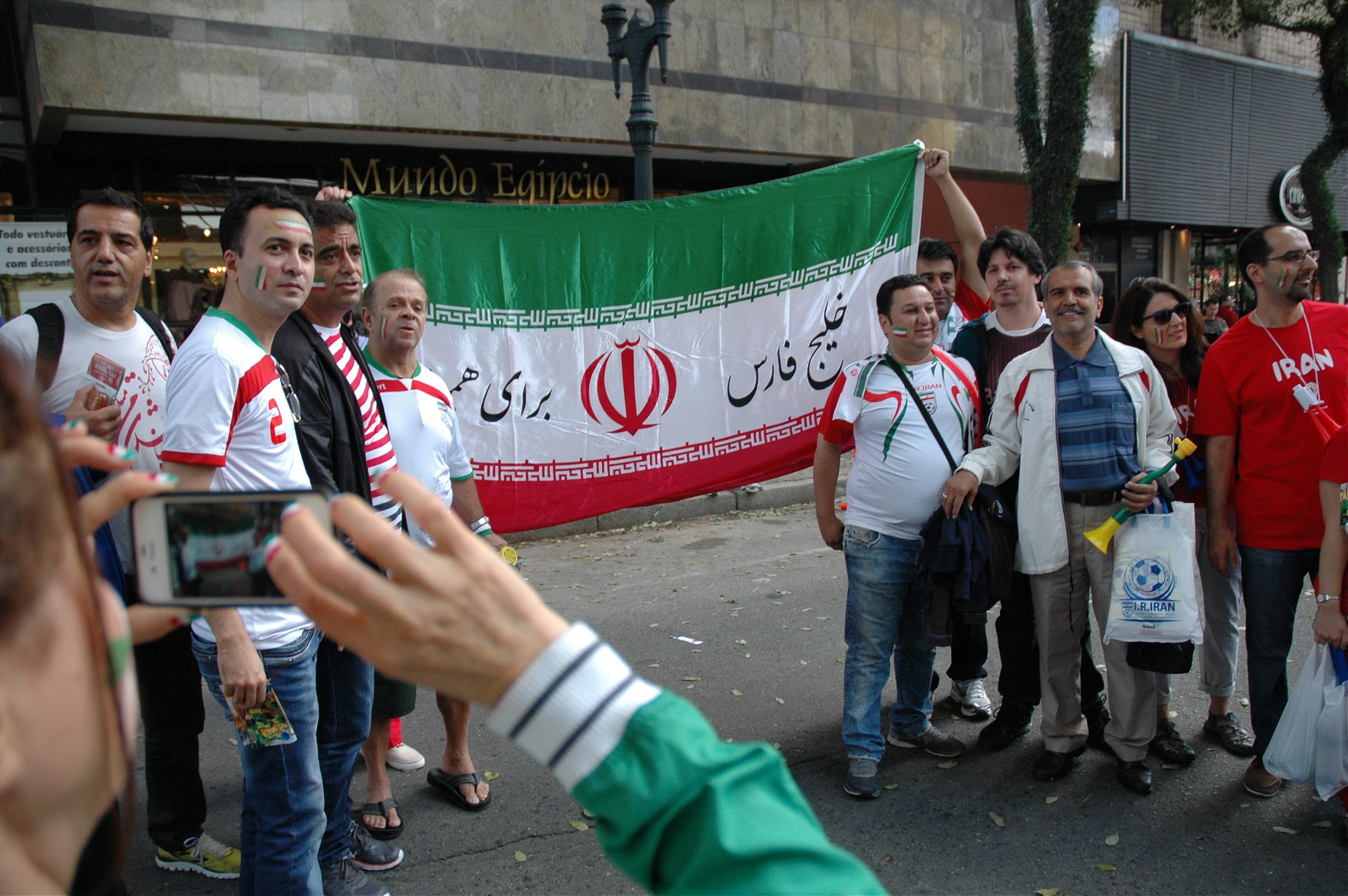
These are warring banners, though—those wearing the shah flags have come to Brazil from the UK and Germany and Canada and the United States, the places that they fled to when the revolution happened. They’ve held onto their flag, and to the much of the bitterness of what they lost when they left. And those wearing the Islamic Republic flag, well, they could be any kind of person, but they probably live in Iran still. They have their own ideas about who the Shah and his supporters were, and what they took with them when they left Iran.
And yet: here they are, not fighting, but instead chanting the same chants in Farsi. Besides do-do-do-doot-IRAN! there’s one that loosely translates to “What will Iran do to them?! Iran will put holes in them!” and there’s also that song by the Swedish-Iranian singer Arash, “We are All Iran’s Children”, which was written for a past World Cup but is still in use. And really, though the music isn’t much, the words say it all. In front of the Hotel Pestana, two hours before their first World Cup match since 2006, all these factions are armhugging and taking selfies and drinking beer and being very excited about Iran! Iran! Iran!
Negar Mortazavi is in this crowd, a turn of events that seems to have surprised her. The genesis for the trip was fairly recent: it started with a conversation with friends who work for Twitter’s media division. Mortazavi, a DC-based freelance journalist and former presenter for Voice of America Persian never really cared much for sports, especially not soccer, which is, as she says, “such a men’s game in Iran”.
But she took notice when her friends told her that Iran was the only one of the 32 World Cup teams that had no real Twitter presence. She volunteered to rally some of the key players to get Twitter accounts and then get them verified before the World Cup. Twitter’s brass loved the idea. Co-founder Jack Dorsey tweeted out a welcome to player @HosseinMahini when he joined, @TwitterSports celebrated the arrival of @khalatbari9 and the Turkmen-Iranian @SAzmoun, AKA the Iranian Messi.
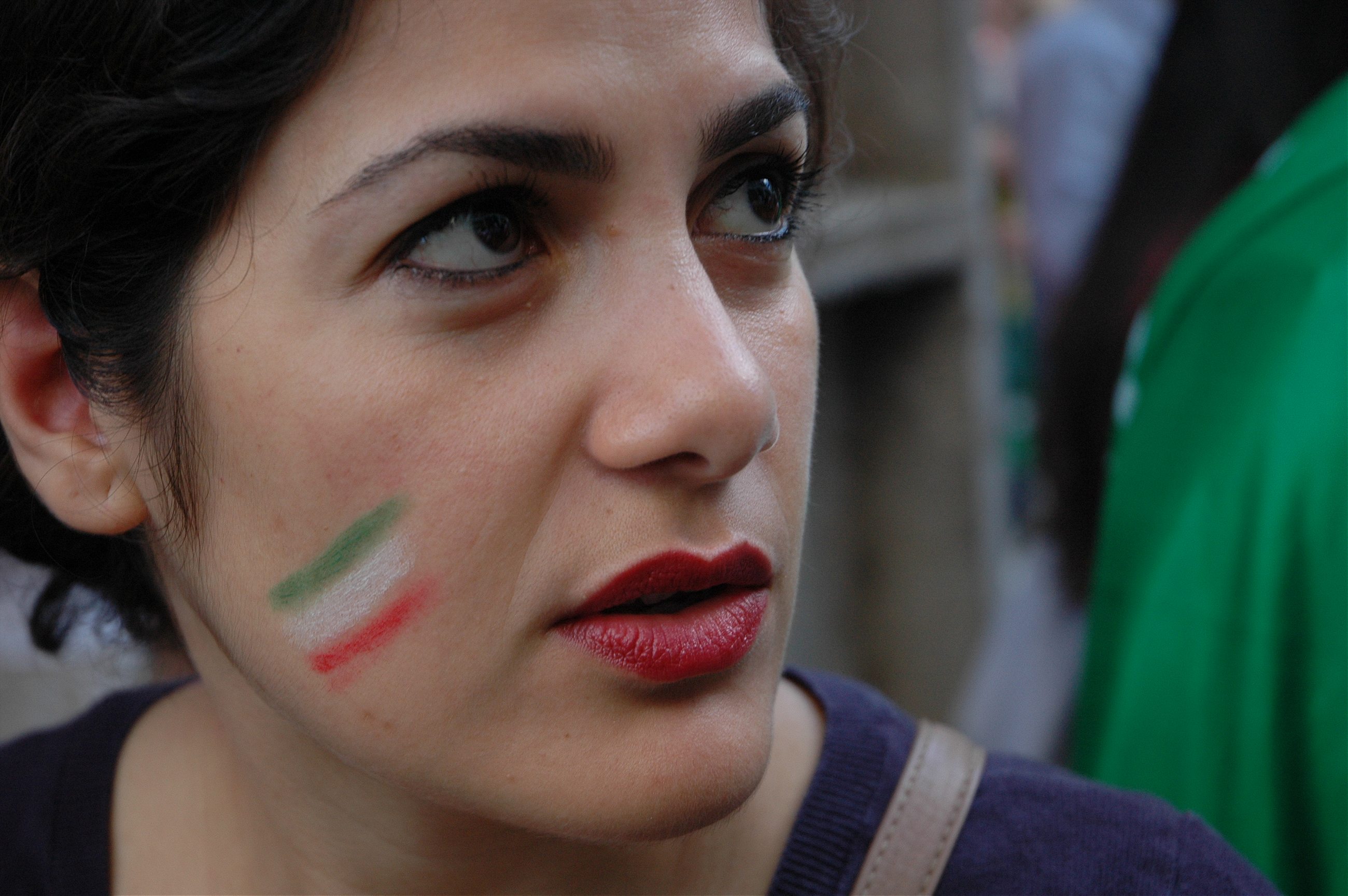
The Twitter absence is a small thing, perhaps, but telling. Twitter is blocked in Iran, but as in Turkey and elsewhere, people use it freely with VPNs and other workarounds. “Everyone’s on Twitter there,” says Mortazavi. “The team should be too.”
There’s another reason why Mortazavi wanted to help. It’s because of the scene here at the hotel, actually. This World Cup team seems built for her, or at least for diaspora Iranians like her. The lineup includes an unprecedented number of overseas players, the result of Portuguese coach Carlos Quieroz’s aggressive recruiting throughout Europe and even the U.S. Steven Beitanshour, pride of Leland High in San Jose, is on the team, as is German-born Daniel Davari and others who spent their adult lives abroad. The coaches are likewise global—not just Quieroz, but a goalkeeper coach from Connecticut and other staffers from Cape Verde and Mozambique.
HER KICKSTARTER PROJECT WAS FUNDED IN A DAY, AND MORTAZAVI WAS IN BRAZIL BEFORE SHE REALLY UNDERSTOOD WHAT HAD HAPPENED
So Mortazavi had the idea—actually, a Bloomberg reporter she knows told her to do it—to tell the English-speaking world about Team Melli (melli means ‘national’ in Farsi) and why theirs is a unique moment in sports. She did what American journalists do now—she launched a Kickstarter to fund her reporting trip here. That was one week ago. It was funded in a day, so she hurried back to Washington to get a visa, and was in Brazil before she really understood what had happened.
For Mortazavi, who was born and educated in Tehran but moved to the U.S. in 2002, it’s cathartic. “I’m not a sports person, especially not football,” she says. “But there are bridges being made here. It’s so important for a Dutch player to be playing for the team, singing the national anthem.”
So she will be live-tweeting the matches and the hotel-gatherings and following the news from back home. “The government there is afraid,” she says, “of what the diaspora might chant, or what else might happen. It’s too interesting to miss.”
“And besides, people tell me this is the most ready the team has been in any World Cup,” she says. “This is the year.”
THE U.S. FROZE IRAN’S FIFA MONEY FOR A TIME BECAUSE OF SANCTIONS INITIATED IN FEBRUARY 2012
I’ve heard this everywhere in Curitiba. This is finally a worthy international side. That alone is remarkable, given the obstacles that have faced Team Melli. The team is woefully underfunded, and the U.S. froze their FIFA money for a time because of sanctions initiated in February 2012. They also had inordinate trouble scheduling warm-up matches, and had to settle for a rogues gallery of outlier states and small Caribbean countries to play against. In May, at the height of his frustration, coach Quieroz told the media that “those who think Iran’s national team will be successful with only 14 days of preparation, are either crazy or are living in Disneyland.”
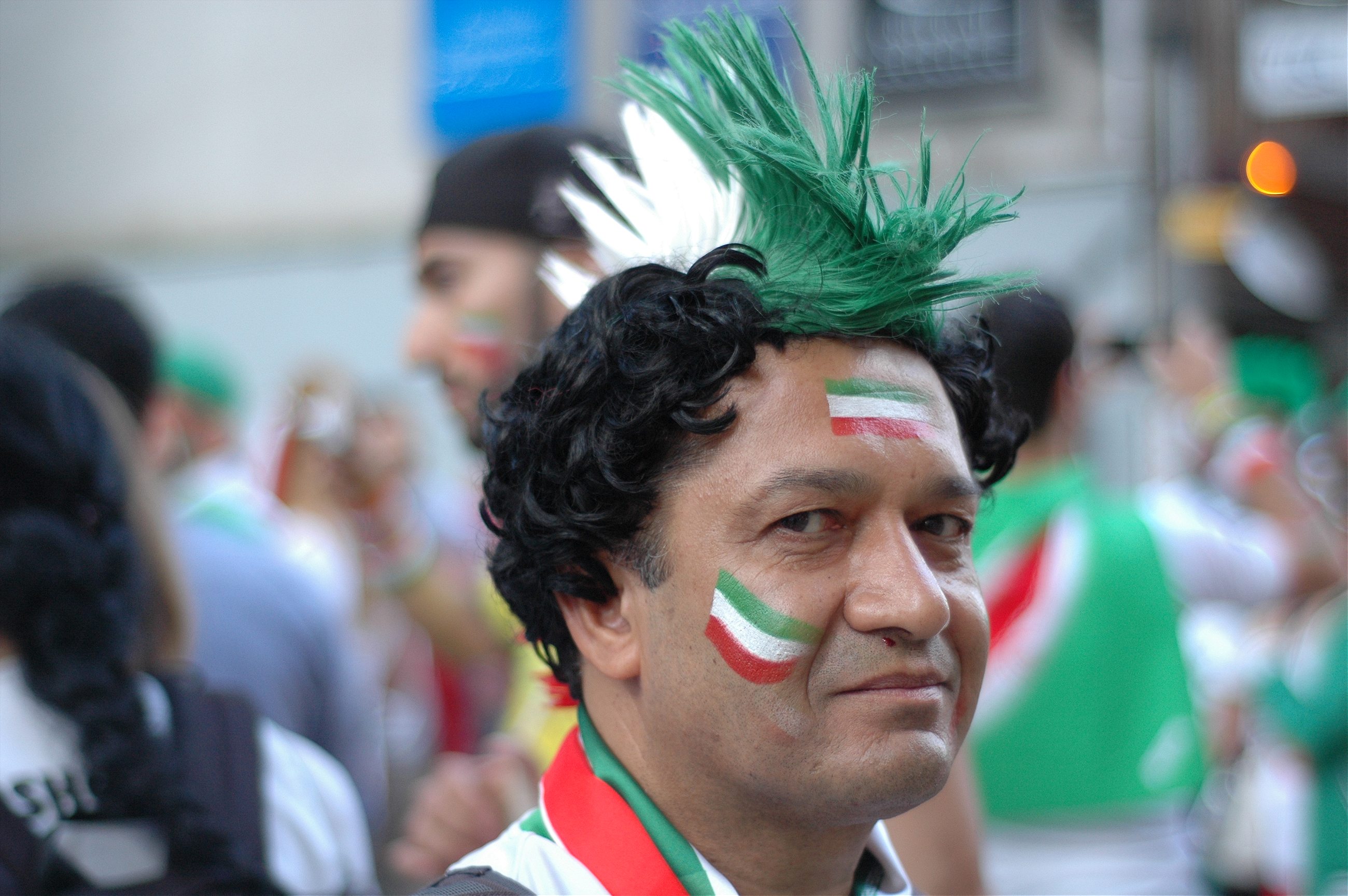
For this team, then, the first game is key, not just for the points needed. As Hamed Fazlikhani, who flew here from his home in Bergen, Norway, put it: “We Iranians are very emotional. We are not like Germans, or Norwegians, we are not a systematic cold machine. If they do well this first match, they will feel great about themselves. But if they do poorly, they will be devastated.” Even Quieroz described it as “the game of our lives.”
What then to make of the tense, scrubby match that actually took place? It ended in a 0-0 draw, which did not at all please the mostly Brazilian crowd, which, I’m told, prefers the game beautiful. The crowd was mostly local because, well, it was Iran-Nigeria, which aren’t known for their mass-travel fan bases. A writer for Tehran’s Goal Magazine told me that about 1,500 people got visas to come here from Iran directly. Surely two or three times that many came from outside Iran, but that’s still a small portion of a stadium that can fit 39,631 people.
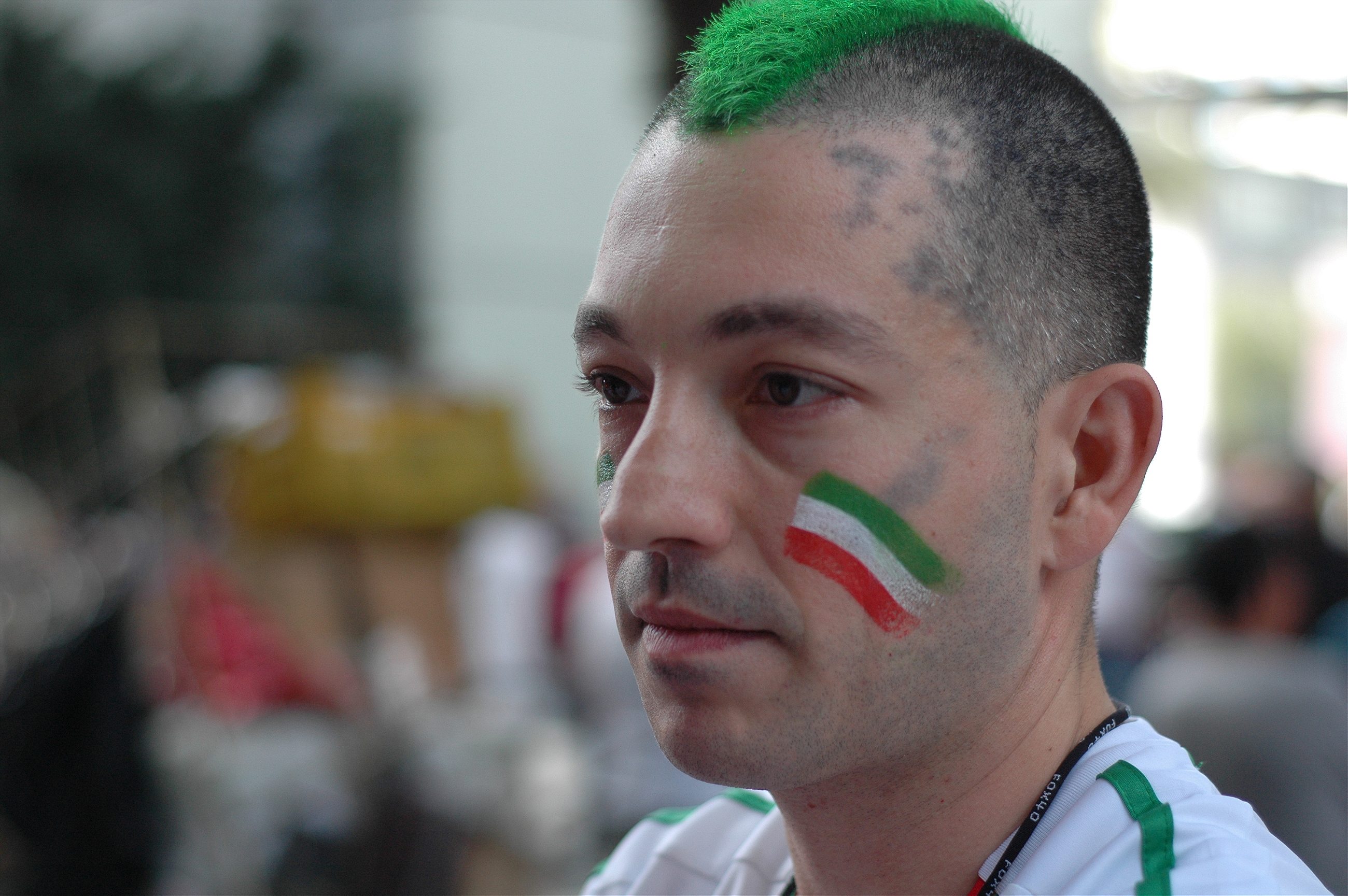
But on the field, it must have felt like relief to the Iranian side. The Super Eagles of Nigeria are a good team, and controlled the action throughout, and if it weren’t for the superb forehead-defense of Iran late in the game, in which every Nigerian shot attempt seemed to hit an Iranian right between the eyes, it would have been a sure defeat. Iran still has only ever won one World Cup match, the 1998 stunner over the U.S. The story of this Cup remains unwritten.
The real action during the match was in the stands, with the many, many choruses of do-do-do-doot-IRAN!, and in the media tribune, where a writer from the conservative Vatan-e-Emrooz political paper in Tehran seemed delighted to be seated next to an American reporter. In between surreptitious puffs of Marlboros (it takes a special talent to smoke in the hermetic corporate laboratory that is a FIFA Media Zone), Hosein taught me valuable things, like how to say Fuck Your Mother to the refs in Farsi. Sure, we’re still fighting each other in proxy wars in Syria and Lebanon, but we have a new common enemy in the Sunni-led ISIS movement. And the U.S. and Iran share a style of soccer, apparently: both nations like to allow their opponents to hold the ball much longer and worry their keeper much more frequently, while they wait for fortune to intervene. Rapprochement has been built on less common ground.
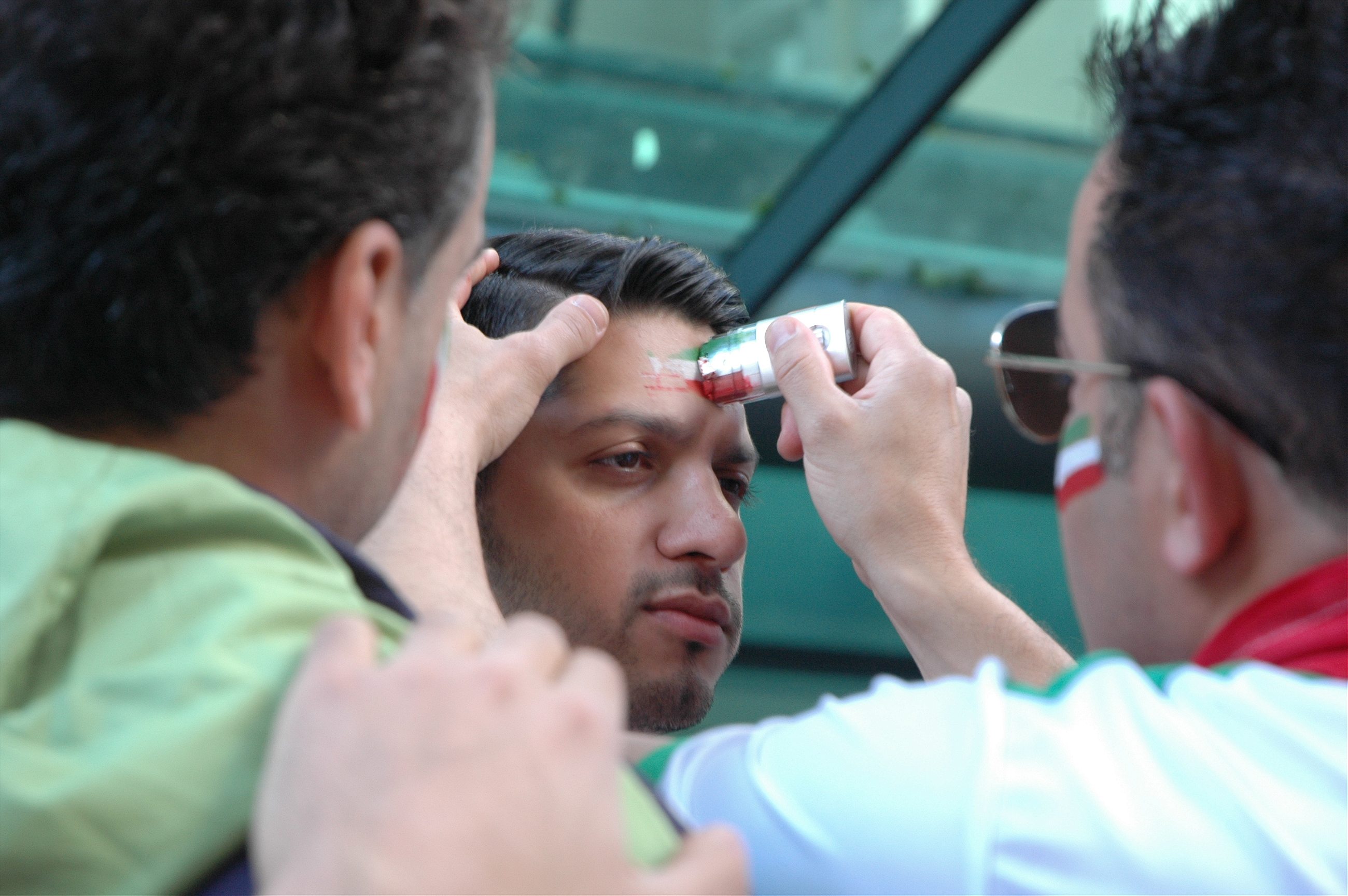
Curitiba played more or less the role of silent witness to all of this. In theory, it is a fine town to host a World Cup. Even in immigrant-heavy Brazil, it’s a remarkably diverse city, full of Polish and Ukrainian and Japanese Brazilians. Among the endless parks in the city are the German Woods, the Portuguese Woods, the Woods of the Pope (dedicated by the Polish, of course), Japan Square, Spain Plaza. The legend is that the famously slow Curitiba way of speaking evolved because everyone here at some point was an immigrant just learning how to speak Portuguese, so they enunciated slowly and carefully, which has turned into a local dialect.
But in practice, the World Cup does not mix with any of its towns. The Curitiba Fan Fest was held in an old quarry, the Pedreira Paulo Leminski. Bands like AC/DC and Paul McCartney used to play there, but a lawsuit from neighbors shuttered it for almost a decade. Now it’s just been reopened three months ago, just in time for whatever it is that the Fan Fest is supposed to be. The night before the game, there were a few hundred Iran and Nigerian fans, alongside some locals, all drinking overpriced Brahma Beer and watching Argentina play on a big screen. But the overriding culture was corporatism—a Coca-Cola lounge with soccer-ball beanbag chairs, a Brazilian bank’s carnival booth with a kicking game that got you free checking or somesuch. The biggest teams were the teams of military police who spread across all nearby streets, ten abreast from sidewalk to sidewalk. The red jerseys for all the Team Coca-Cola marketers made a strong showing, as did other colors for Team Sony and Team Kia. These are pop-up events for a pop-up tournament. Curitibanos neither rioted against nor rallied in favor of these games. It is a good thing this southern city is famously relaxed, because the traffic on match day alone, when 20 square blocks of central Curitiba were transformed into a sealed-off FIFA security zone, snarled life everywhere.
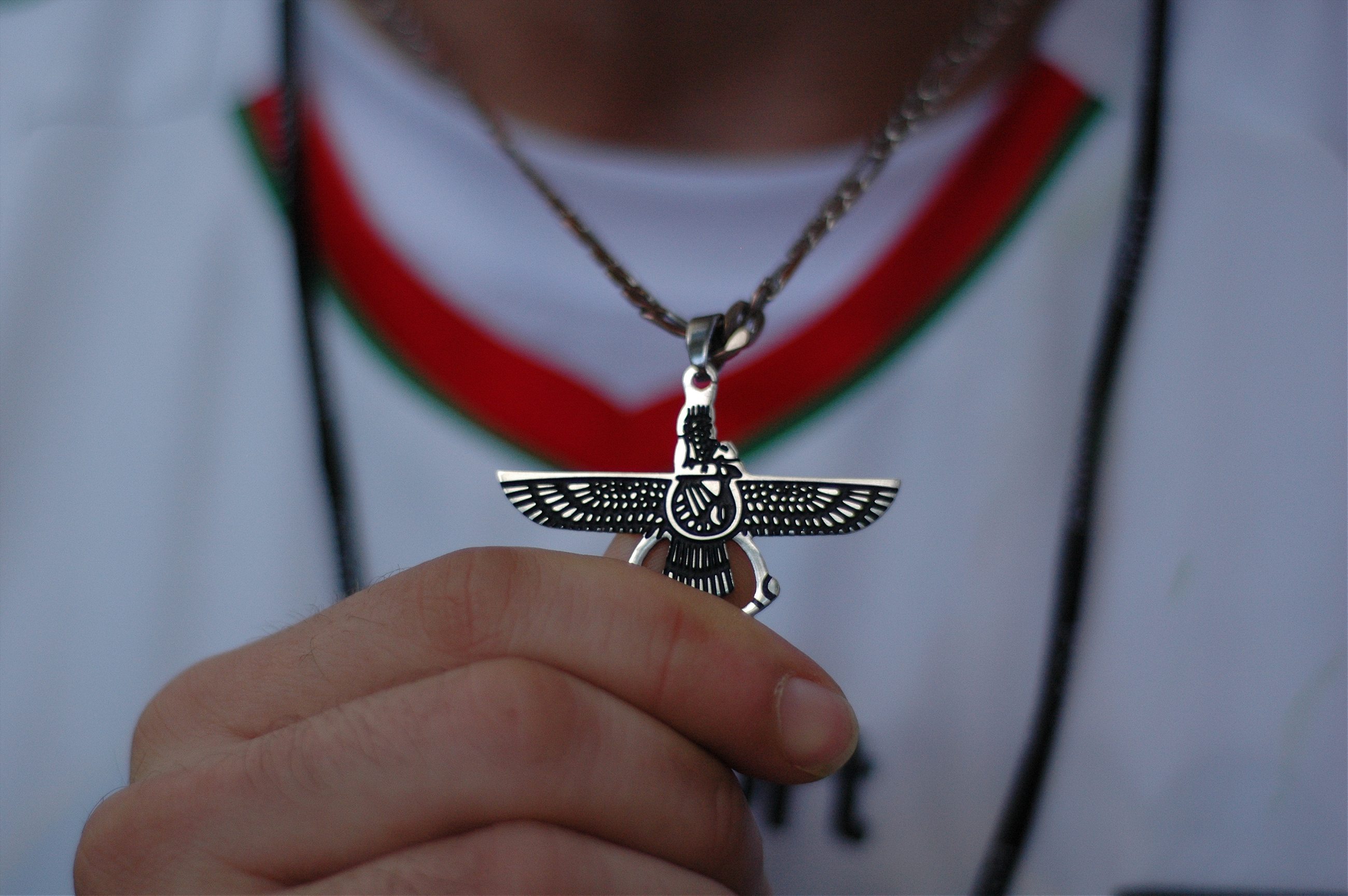
But this matters little back in front of the Hotel Pestana. Arash (not his real name), 20, came from California, but he met up here with his cousin Ahmad (also not his real name), 22, a lanky British-Iranian from England. Their fathers are also here, and they all seem to be enjoying the family reunion in advance their team’s opening match. Ahmad’s father records video on his phone as his son holds a beer high and leads a cheer in Farsi. Arash wears the flag of the Shah and ventures a little too close to the Iranian delegation security guards who are guarding the front of the hotel. They tell him to take off his Shah flag, and hand him a small green Islamic flag instead.
Ahmad laughs it off, and makes a bandanna out of the green flag. “We’re not in Iran, you know?” he says later. “We can wear what we want.”
“The world has a misconception of what Iran is all about,” says Ahmad. “People aren’t violent. They love the west. It’s the government that has a problem.” He looks over his shoulder. Horns. Beer. Chants. “This is what Iranians are like. These aren’t terrorists.”
(That lesson in particular bears repeating: Closer to the stadium, one Brazilian whom I can only think is just a total asshole got a Team Melli jersey and then put on some sort of Halloween-costume Iron Sheik headdress and robe over it and was walking through the center of town shouting “Iran! Iran! Bomb! BOOM!”)
Ahmad and Arash agree that if they had sons who played international soccer, they would want them to play for Iran. “It would be their choice,” Arash says. “But we hope it would be Iran.”
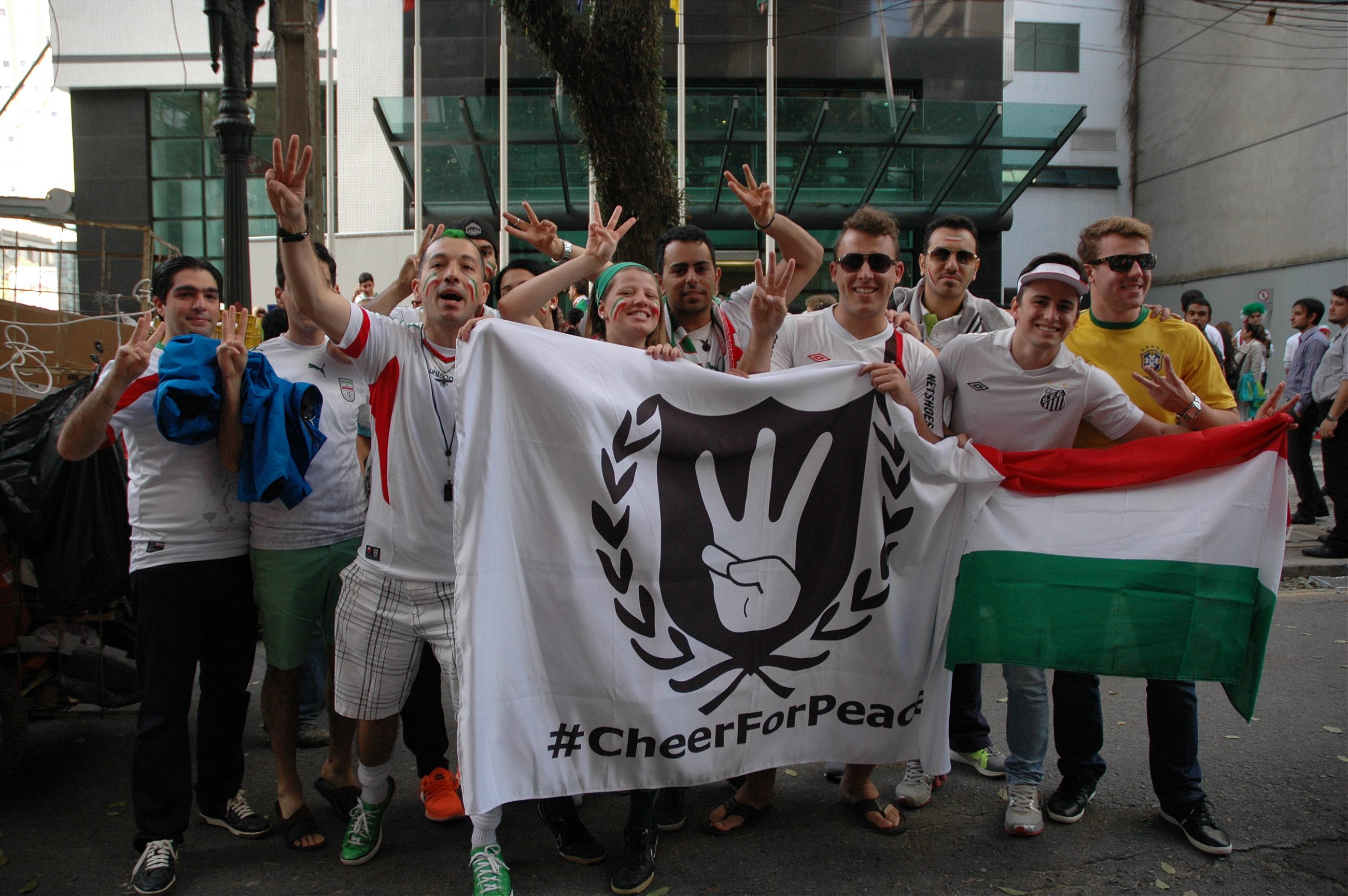
It’s no small point. Here in Brazil, anger at the government (which shares Tehran’s predilection for corruption and overspending) has caused many to wish for the unthinkable—a quick and humiliating exit for Brazil in the World Cup. Otherwise, especially if Brazil wins the Cup, the validation for the government would be too much. They would be reelected, and the mismanagement would continue anew. Diaspora Iranians have far deeper grievances, but they all are pulling for their improbable team together. They don’t care if the authorities in Tehran—who have continued to make asses of themselves by banning the showing of the World Cup in cafes to prevent street unrest, and by the ongoing ban on women in football stadiums—would become even more smug if Iran advances. They are proud Iranians, first and last.
A fan in an Iranian jersey with the flag painted on his face stands on a planter and yells out for quiet in the crowd. Mortazavi translates for me. “Keep it quiet! The team is inside praying. Let’s not disturb them. And when they come out to the bus, let them focus. Let’s keep it down.”
And with that, all the Iranians fall silent, for the moment at least.
